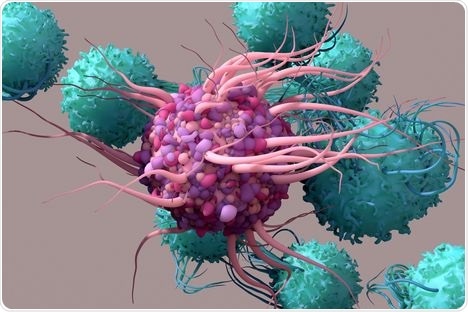When the immune system fails and assaults the body’s own components, autoimmune disorders develop. Although there is no treatment for many disorders, therapeutic approaches can help to delay their course.

Image Credit: Medical University of Vienna.
Scientists at the Medical University of Vienna’s Center for Physiology and Pharmacology have observed a central signaling pathway in immune cells that could help with the development of a novel therapeutic strategy. Their findings were recently reported in the journal Cell Reports.
The immune system defends the body against all types of infections and is constructed to differentiate between external attacks and the body’s own tissues. T cells are an important part of the immune system because they are implemented at the command of other immune cells called dendritic cells. Dendritic cells are not only in charge of stimulating T cells but also for deactivating them, primarily to keep them from targeting the body’s own tissues.
This method, known as immunotolerance, is central to conventional treatments for autoimmune diseases, which involve the use of pharmaceutical agents (JAK inhibitors). The goal is to slow the progression of the autoimmune disease by inhibiting T-cell activity against intracellular structures.
JAK inhibitors are used to treat rheumatoid arthritis and other autoimmune diseases. Several experiments have shown that the inhibitors have an effect on all immune cells at the same time.
Gernot Schabbauer and Omar Sharif of the Institute of Vascular Biology and Thrombosis Research at Medical University of Vienna’s Center for Physiology and Pharmacology have now explored the specific effect of JAK inhibitors on dendritic cells and, in general, the role of T cell immunotolerance (peripheral T cell tolerogenesis) in autoimmune diseases.
Targeted cell-based therapy
Researchers found a key building block in immune cells that is important in the context of autoimmune diseases while working with investigators at the Christian Doppler Laboratory for Arginine Metabolism in Rheumatoid Arthritis and Multiple Sclerosis at Medical University of Vienna and St. Anna Children’s Cancer Research.
This is the signaling pathway in dendritic cells that promotes T-cell tolerogenesis. This enables the dendritic cells to increase the immunotolerance of the T cells in particular and prevent them from attacking the body’s own structures.”
Andrea Vogel, Study Lead Author, Institute of Vascular Biology and Thrombosis Research, Medical University of Vienna
The results of the study are a step forward towards a possible new cell-based therapeutic strategy for autoimmune disorders. The goal is to deliberately target the dendritic cell signaling pathway to “turn off” the misguided T cells and slow the progression of the autoimmune disorder. Andrea Vogel concludes the future goals of this research stating, “The next thing we want to investigate is whether this signaling pathway in dendritic cells also plays a role in cancer.”
Source:
Journal reference:
Vogel, A., et al. (2022) JAK1 signaling in dendritic cells promotes peripheral tolerance in autoimmunity through PD-L1-mediated regulatory T cell induction. Cell Reports. doi.org/10.1016/j.celrep.2022.110420.